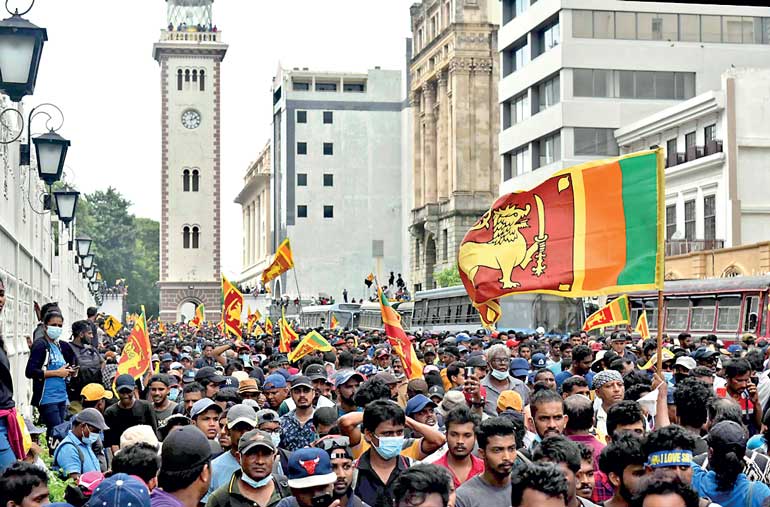Saturday Feb 21, 2026
Saturday Feb 21, 2026
Tuesday, 16 August 2022 01:11 - - {{hitsCtrl.values.hits}}

 Preface
Preface
This article is dedicated to the interests and toils of the courageous Sri Lankans’ sacrifice, unswervingly united and bound by the exacerbating unheeded mounting people’s dire needs – unmet or inordinately delayed – exceeding limits of endurance, erupting the “Aragalaya”, the people’s struggle fervently clamouring for ‘systems change’ and renouncement of the President and the Prime Minister.
Furthermore, aims to clarify the people’s obscurity of the precise constitution of its “clamoured” ‘systems change’, its precise legal status, the inhibitions constitutionally hindering fulfilment of the “clamour”, its causes and remedies – seemingly misled by miscreants feigning as expertise expediting the change.
The aforesaid obscurity is also attributable to the lack of discernibility of the prime driver that has been eroding good governance for generations of the Parliament. It’s the obscurity of the breach of the indivisibility and non-delegacy of the most supreme Peoples’ FR , Constitutionally prescribed and defined by Peoples’ Inalienable Sovereign Right, (PISR) at Constitution’s clause 3 but defied and thereby breached by the Constitution’s clause 4 usurping the Peoples’ PISR and demeaning the People to be less inferior to the “Peasantry” of the Feudal System. It’s the guileful motive the system of governance to exploit the usurped PISR to legalise rent seeking corrupt activities. Equally supportive of the motive is the non-recognition of the PISR as the foremost of the FR listed at Constitution’s clause, let alone its inclusion in the list of FR.
Likewise the equally if not nationally far more harmful inordinate delays of mounting backlog of court cases, explicate in the column have not received any attention of the “clamour”, notwithstanding the peoples’ judicial power as prescribed at Constitution’s clause 4(a) is exercised by the Parliament through court system – thus evincing that the court inefficacies aberrances have been neglected for ages of the Parliament. The cause and remedies of the aforesaid lapses and aberrances are explicated below at the suppressed contradictory controversies of the Constitution’s clauses 3 and 4.
The suppressed contradictory controversies of the Constitution’s clauses 3 and 4, and remediation
1. The root cause of the mass discontent prolonging heeding to its demands and its remediation is the breach of the indivisibility non-delegacy of the most supreme Constitution’s Right:
The Peoples’ Inalienable Sovereign Right (PISR), defined at Constitution’s clause 3 but defied and thereby breached by the Constitution’s clause 4. This breach of PISR seems from the views opined has not been realised by most of the legal fraternity let alone those who crafted the Constitution. It’s also evinced by the:
1.1. The prolonging of heeding to demand of the discontent masses essentially attributable to Constitution’s failure to include the PISR foremost in the Fundamental Rights (FR) list at Rank 1 let alone its inclusion in the list of FR; and
1.2. Failure to identify that the prime driver impairing Good Governance – escalating Peoples’ dire needs unaddressed or inordinately delayed including those of litigant populations afflicting in turn an adverse domino impact on the national productivity and the economy.
1.3. The accomplishment of system change clamoured necessitates restoration of the breached power and activation of PISIR
2. The breach of prescribed definition of PISR, is evinced from the Constitution’s clause 4 delegating the non-delegable power of PISR to five constitutional entities: the executive, the people’s Judicial power, the Fundamental and the Franchise and thereby defying the prescribed indivisibility of PISR by distributing it to five entities
2.1. Far more harmful socio economically, is the failure of the Constitution to preserve the indivisibility non-delegacy of PISR by including People Centric Constitutional Council (PCCC) of composition undermentioned at 3 below. The PCCC is needed to ensure coherent integrated coordination and monitoring real time the five entities i.e. including those of functionalities of the entity exercising People’s legal power – the deliverables of which as explicated is plagued with unchecked aberrances afflicting inordinate delays inflicting harsh burden on the litigants and erosion of the economy; and
2.2. Such role also will enable to accomplish “Good Governance” through real time remediation of aberrances if any of any of the FIVE entities aforesaid and also restoration to normalcy, any impaired QoS of any deliverable of any of the Five Entities within a prescribed a time limit proper to the deliverable, at worst not exceeding two months.
3. Consistent with the needs aforesaid it’s imperative that the PCCC should, – to accomplish “Good Governance” referred to at 2.2 within the time limit prescribed – comprise besides other categories the mandatory People Centric Multidisciplinary Specialists (PCMS) of Appropriate Dimension, Mix, Size, and Flexibility, facilitated by a Fully Integrated Info System (FIIS) supported by National Sector Regulators accountable to PCCC. The PCC also should:
3.1. Account for and restore the overlooked status of PISR as the Apex of the FR placing it foremost at Rank No.1; and
3.2. Note the imperativeness of coherent integrated coordination of the standalone five entities of the PISR which at Constitution’s clause 3 is prescribed to be Inalienable
4. Thus considering criticalities cited at sections 2.1 to 2.3 and 3 above to ensure efficacy and quality of the deliverables of the Interim Government serves the immediate priority needs of the People, its highly recommended that the legislature approves sections 2.1 to 2.3 and 3 above, to enable its applications to hasten the restoration of the economy to that prevalent at least 4 years prior to the pre-crisis.
4.1. If approved it would provide a reference framework for refinement of sections 2.1 and 2.3 progressively to acquire in-depth understanding of the real-time monitoring, remediation supported by coherent coordination to preserve requisites of indivisibility non-delegacy of the PISR by availing of concept of investigation by analogy. This concept has since antiquity proved heuristically to possess capability to generate insight and formulate possible solutions to problems to for a wide variety settings – such view is also endorsed by the Joseph Priestley, a pioneer in chemistry and electricity that Analogy is our best guide in all philosophical investigations; and all discoveries, which were not made by mere accident, have been made by the help of it. (1769/1966);
4.2. An illustrious example of a simple analogy of a modern umpiring system to the Judiciary envisioned by the CJ of USA. It shows the transparency, swiftness and, the high reliability of the outcome of the analogy delivered by the DRS (3rd Umpire) availing of scientific methodology uninfluenced by emotion or bias the judiciary of Sri Lanka is often prone to. A noteworthy instance is the past CJ begging pardon from the public for miscarriage of justice privileged by Juris prudence that the judgment is final though may not be infallible. Other more precise analogies like a controlled space probe directed to remote target or a “driverless” car directed on a collision free course may be considered once the use of the aforesaid USA CJ’s simple analogy is mastered;
4.3. Above is also endorsed by the profound citation of Justice Robert Jackson of the United States, on the heralded Judiciary’s divine Supremacy, pronouncing “We are not final because we are infallible, but we are infallible only because we are final” – a rare admission beyond legal fraternity’s bounds of supremacy , usurping People’s Judicial Power, for fraternity’s enrichment also illustrated by Precursors Breaching Peoples Judicial Power of the column Sri Lanka’s Judiciary, Oppressed Litigants & Defied Public Discontent published by Colombo Telegraph dated 31 March 2021; and
4.4. In context above its pertinent to note the litigant population of the escalating case back log, pending on the average for over a decade said to be over 850,000, is around 70,000 commuting daily to courts most just to be informed of the next calling date incurring a daily productive loss of around 50,000 man hours, which in turn contributing to an averse domino effect on the national productivity and national income.
5. If such multidisciplinary unit like the PCCC appropriately dimensioned by mix, size and flexibility, the purpose and composition of which is explicated at section 2.1. and section 3. The section 3, also introduce means to surmount critical lapses of the current system, the Constitutional entity of Expertise, the PCMS supported by FIIS vital for expedient resolution of disputes, aberrances and restoration of impaired QoS to Normalcy. Then it would avert recurrences of exacerbating peoples’ discontent unifying to mass protests disrupting public needs, demanding change of system
Conclusion
The root cause as one could see from the current protests was triggered due to culmination of public discontent and the ambiguities of coexistence, integration of clauses 3 and 4 and also the interpretations. Rest of the controversies, are resultant by-products of non-conformance, non-compliance. The divisibility and delegacy, ref to clause 4, have created skewing of power to three main organs, aberrance to PIS, violated the prime entrenched provision of clause three with imbalance of power and further exacerbated with enacting 20A. Over the past 2.5 years the public who were unconcerned of and ignorant, supressed by political manoeuvring have successfully aired their grievances, concerns, waging mass protest rallies countrywide.
As suggested in section 3 above, and listed as a core demand, a People Centric Multidisciplinary Specialists (PCMS) council is needed to be established to clear the roadblock to clause 3 which was being high-jacked by clause 4. The PCMS functions require the support of IT tools e.g. FIIS to work transparently, no delays and bring Peoples’ Inalienable Sovereignty in addressing issues.
The writer’s personal view is not to add patches as constitutional amendments but to tear off the current constitution and prepare a new constitution addressing all the irregularities and ambiguities including provisions for establishment of independent PCMS council thus protecting the PIS as specified in Clause 3 and preserves the five sub-items of Clause 4 without being delegated. It is also vital that formulation of constitution, the clauses, be constructed to bring just-fair outcome in the event of non-compliance and neither being prescriptive nor discretionary. However, preservation of Peoples’ Inalienable Sovereignty Rights should not be compromised with divisions and delegation as written in Article 4 of the constitution and no restriction to exercise of Article 14 being a jurisdiction of common law.
It is also must be recognised the complex and interlocking network of the relations between the legislature, the executive, and the judiciary. To effectively implement the need for oversight mechanisms, through which officers may be held responsible for their actions, the aforementioned “People Centric Multidisciplinary Specialists Council” is needed. The past records and commentaries, over the decades tend to believe the independence of the three organs have been concealed by political interferences of the respective hierarchies.
Few observations that have cropped up whilst reading the Constitution were the definition, differentiation between entrenched and mandatory provisions and directives. It was also observed the inadequacy in the constitution to provide remedial measures and follow-up actions in the event such clauses have been either violated or non-conformed. A good example was the recent case challenging the UNP national list nomination of not conforming to one-week notice period to forward nomination to commissioner of elections.
Finally, I wish to quote reference to Jean-Jacques Rousseau’s ‘Du Contrat Social, ou Principes du droit politique’ (1762), the Sovereignty, or will of the people, is inalienable, for the will cannot be transmitted; it is indivisible since it is essentially general; it is infallible and always right, determined and limited in its power by the common interest; it acts through laws.
References:
[1] https://www.ft.lk/columns/Amendment-to-the-Constitution-21A-and-beyond/4-735817
[2] Commonwealth (Latimer House) Principles – of Commonwealth Secretariat